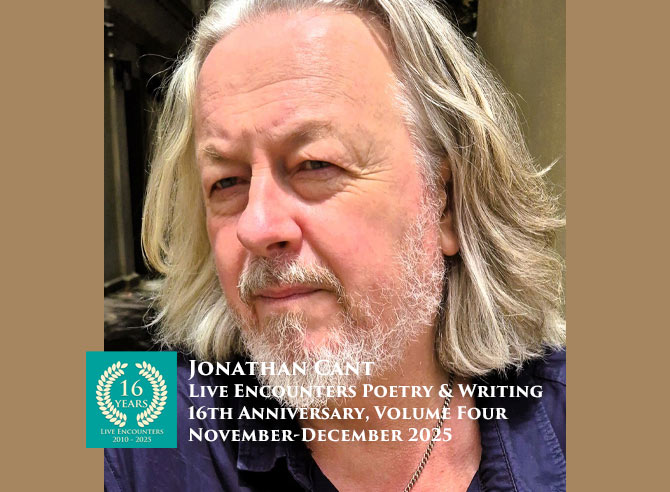
Live Encounters Poetry & Writing 16th Anniversary Volume Four
November- December 2025
The Cost of Living, poems by Jonathan Cant.
The Cost of Living
I’m walking past brown brick terraces in an old part of the city
as a train whooshes by one block away. The footpath is cracked
and uneven. Under my breath, I curse the city council for not fixing
it for the sake of public safety. I come across a woman
in her late eighties straining as she tries—using the handle
of her walking stick—to reach some fruit in a tree high above.
She’s very short, has many teeth missing, and a dark melanoma
on her bottom lip. I offer to pick the exotic-looking fruit for her.
“Thank you, this very kind,” she says in a heavy accent. I’d never heard
of the plant Monstera deliciosa. “Delicious monster”: what a paradox.
Is it possible to be two distinct things at once, I wonder? I weigh up
the worst of my traits against the best. Am I a walking contradiction?
A negative thought here, soon followed by a positive deed there? Perhaps.
Monstera deliciosa: aka Mexican breadfruit, Penglai banana, or simply
the Fruit Salad Plant. Native to Central America, it’s edible and is also used
to make a cure for arthritis. Its fruit looks like a green ear of corn covered
in tessellated, hexagonal scales; and is said to taste like peach meets pineapple.
“Is good to chop on top of salad,” she tells me as I hand her the key ingredient
for tonight’s meal. I look up at the large leaf of this bountiful tree—fruit for free
—and I’m happy to see it just happens to resemble the shape of a big green heart.
Divine Intervention
A winter chill creeps its way along a London
street. Like dry ice, vapours haunt the man-
hole covers. Somebody stepping off
the kerb is struck by a delivery truck
skidding around the corner on the wrong
side of the road. And you wouldn’t think
a skull cracking could sound so metallic.
He’s not even cold as curious onlookers
gather. Some walk right up close
to stare. There they stand—a flock
of bewildered sheep—indifferent and
absurd, reaching a silent, collective
verdict: they’ve just lost one of the herd.
Time ticks away. No sign of help.
A dark red thought bubble expands
next to the man’s head on the road—
where he lies motionless, his open
mouth and eyes facing the sky.
And, on the side of the frozen goods van,
the company name reads Puritan Maid.
The French Café Chair
In Twenty-Nineteen, a young religious zealot
went on a violent rampage through Sydney’s
city streets. He began by stabbing a female
sex worker to death—perhaps because
she offended him, or worse: offended, Him.
He fled the scene with a huge kitchen knife
and began chanting his hymn of hate at scared
bystanders. I watched him run—blood-soaked—
down York Street that day as he was chased
by brave citizens. One pursuer grabbed a café chair
(yes, of all things!) to use as a weapon and defence
against the man’s large knife and ranting threats.
Finally, he was cornered by civilian heroes close to
Wynyard Station. Together, they tackled the raging
man and pinned him to the pavement with nothing
more than that elegant café chair. Unlike Religion,
the Age of Enlightenment was born in coffeehouses,
not in barren, empty deserts. Reason drinks espresso.
© Jonathan Cant
Jonathan Cant is a writer, poet, and musician. His work was shortlisted in the 2025 Gwen Harwood Poetry Prize; won the 2023 Banjo Paterson Writing Awards for Contemporary Poetry; was longlisted for the 2023 Fish Poetry Prize; and commended in the W. B. Yeats Poetry Prize. Jonathan’s poems have appeared in Cordite, Island, Verandah, fourW and Otoliths.

